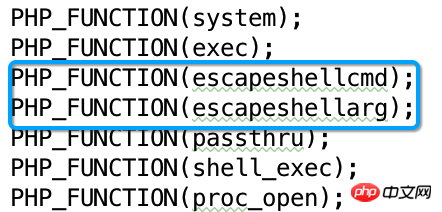Home >Backend Development >PHP Tutorial >How to execute external programs in PHP
How to execute external programs in PHP
- 墨辰丷Original
- 2018-05-18 14:04:101434browse
这篇文章主要介绍了PHP实现执行外部程序的方法,结合实例形式分析了php执行外部程序的常用函数相关使用技巧与注意事项,需要的朋友可以参考下
具体如下:
在一些特殊情况下,会使用PHP调用外部程序执行,比如:调用shell命令、shell脚本、可执行程序等等,今天在源码中了解了一下PHP执行外部程序的方法,借此机会顺便整理一下。
在源码中 exec.h文件中,列出了可调用外部程序的几个函数,蓝色框里的两个函数只是辅助作用,本文只对其他几个函数做介绍。

前提
1 PHP没有运行在安全模式,关掉安全模式,即:safe_mode = off
2 禁用函数列表 disable_functions = exec, system, shell_exec,proc_open, popen, 如果禁用了,就关掉。
注意:执行外部程序是存在风险的,所以使用这些函数要在确保安全的情况下使用。
exec() 函数
原型:string exec ( string command [, array &output [, int &return_var]] )
描述:返回值保存最后的输出结果,而所有输出结果将会保存到$output数组,$return_var用来保存命令执行的状态码(用来检测成功或失败)。
例子:
<?php exec('whoami',$output, $status); var_dump($output); exit;
输出结果:
array(1) {
[0]=>
string(7) "hedong"
}
注意:
① 输出结果会逐行追加到$output中,因此在调用exec之前需要unset($output),特别是循环调用的时候。
② 如果想通过exec调用外部程序后马上继续执行后续代码,仅仅在命令里加"&"是不够的,此时exec依然会等待命令执行完毕;需要再将标准输出做重定向才可以,例如:exec("ls -al >/dev/null &", $output, $var);
shell_exec() 函数
原型:string shell_exec( string command)
描述:通过 shell 环境执行命令,并且将完整的输出以字符串的方式返回。
例子:
<?php $output = shell_exec('whoami'); echo "$output"; // hedong exit;
注意:
当进程执行过程中发生错误,或者进程不产生输出的情况下,都会返回 NULL, 所以,使用本函数无法通过返回值检测进程是否成功执行。 如果需要检查进程执行的退出码,请使用 exec() 函数。
system() 函数
原型:string system ( string command [, int &return_var] )
描述:执行给定的命令,返回最后的输出结果;第二个参数是可选的,用来得到命令执行后的状态码。
例子:
<?php
system("whoami", $status); // 直接输出
var_dump($status); // 成功时状态码是 0
exit;
输出结果:hedong
passthru() 函数
原型:void passthru (string command [, int return_var])
描述:执行给定的命令,但不返回任何输出结果,而是直接输出到显示设备上;第二个参数可选,用来得到命令执行后的状态码。
用途:当所执行的 Unix 命令输出二进制数据, 并且需要直接传送到浏览器的时候, 需要用此函数来替代 exec() 或 system() 函数
例子:
<?php
passthru("whoami", $status); // 直接输出
var_dump($status); // 成功时状态码是 0
exit;
输出结果:hedong
popen() 函数
原型:resource popen ( string command, string mode )
描述:打开一个指向进程的管道,该进程由派生给定的 command 命令执行而产生。 返回一个和 fopen() 所返回的相同的文件指针,只不过它是单向的(只能用于读或写)并且必须用 pclose() 来关闭。此指针可以用于 fgets(),fgetss() 和 fwrite()。
例子:
$fd = popen("command", 'r');
$ret = fgets($fd);
注意:只能打开单向管道,不是'r'就是'w';并且需要使用pclose()来关闭。
proc_open() 函数
原型:resource proc_open ( string cmd, array descriptorspec, array &pipes [, string cwd [, array env [, array other_options]]] )
描述:与popen类似,但是可以提供双向管道。
例子:
<?php
/**
* @author: hedong
* @date 2017-04-04
*/
// 管道配置
$descriptors = array(
0 => array("pipe", "r"),
1 => array("pipe", "w")
);
$process = proc_open("php", $descriptors, $pipes);
if (is_resource($process)) {
fwrite($pipes[0], "<?php\n");
fwrite($pipes[0], " \$rand = rand(1,2);\n");
fwrite($pipes[0], " if (\$rand == 1) {\n");
fwrite($pipes[0], " echo \"Hello, World!\n\";\n");
fwrite($pipes[0], " } else {");
fwrite($pipes[0], " echo \"Goodbye, World!\n\";\n");
fwrite($pipes[0], " }");
fwrite($pipes[0], "?>");
fclose($pipes[0]);
$output = "";
while (!feof($pipes[1])) {
$output .= fgets($pipes[1]);
}
$output = strtoupper($output);
echo $output; fclose($pipes[1]);
proc_close($process);
}
输出结果:
GOODBYE, WORLD!
注意:
① 后面需要使用proc_close()关闭资源,并且如果是pipe类型,需要用pclose()关闭句柄。
② proc_open打开的程序作为php的子进程,php退出后该子进程也会退出。
总结:
exec函数将输出结果保存在第二个参数上;
shell_exec函数没有参数中接收返回值,而且没有执行成功的状态码;
The system function directly outputs the execution result; the passthru function is the same as the system function, except that it is suitable for processing and outputting binary data;
The popen function will fork a child process and return the file pointer
proc_open function is the same as popen, but can provide a two-way channel
Related recommendations:
PHP implements execution of external programs Detailed explanation of the method
Only the root user can run in PHPExternal program_PHP tutorial
# Summary of common methods for ##python to execute external programs
##
The above is the detailed content of How to execute external programs in PHP. For more information, please follow other related articles on the PHP Chinese website!

